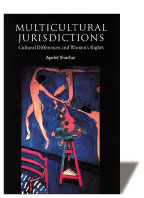 Ayelet Shachar, Multicultural Jurisdictions: Cultural Differences and Women’s Rights, Cambridge: Cambridge University Press, 2001
Ayelet Shachar, Multicultural Jurisdictions: Cultural Differences and Women’s Rights, Cambridge: Cambridge University Press, 2001
Winner of the Best First Book Award, Foundations of Political Theory Section, American Political Science Association. Awarded April 2002.
Editor's Recommendation, Political Studies: one of five books "which seem to make a significant contribution to the study of political theory and political philosophy, or are likely to be of wide interest in the field"
Is it possible for the state simultaneously to respect deep cultural differences and to protect the hard-won citizenship rights of vulnerable group members, in particular women? This book argues that this is not only theoretically needed, but also institutionally feasible. Rejecting prevalent normative and legal solutions to this ‘paradox of multicultural vulnerability’, Multicultural Jurisdictions develops a powerful argument for enhancement of the jurisdictional autonomy of religious and cultural minorities while at the same time providing viable legal-institutional solutions to the problem of sanctioned intra-group rights violation. This new ‘joint governance’ approach is guided by an innovative principle that strives for the reduction of injustice between minority groups and the wider society, together with the enhancement of justice within them. This book will interest students of political and social theory, law, religion, institutional design, as well as cultural and gender studies.
Chapter Contents
- Introduction
- The perils of multicultural accommodation
- Family law and the construction of collective identity
- State vs. nomos: lessons from contemporary law and normative theory
- Sharing the pieces of jurisdictional authority: mapping the possibilities
- Transformative accomodation: utilizing external protections to reduce internal restrictions
- Conclusion
Read a sample chapter from Cambridge University Press (PDF format)
Advance Praise for Multicultural Jurisdictions
"Ayelet Shachar has written exactly the right sort of book about multiculturalism. She understands why parochial groups ought to be accommodated and why accommodating them can endanger their weakest members. Her realism is unblinking; her pragmatism is shrewd. She seizes brilliantly upon a lawyer's greatest advantage - her cases - and argues persuasively, from the cases, with many examples, for a system of divided jurisdiction that makes room for the groups and opens doors for their members."
Michael Walzer, Institute for Advanced Study, Princeton
"How can distinctive cultures obtain respect and each woman and man also be assured liberty and equality? For an original and vital response reframing this issue, advocates, scholars, and policymakers should turn to Ayelet Shachar. She shows how policies protecting groups can hard individuals, and policies protecting individuals can harm groups; and she urges answers that seek simultaneously to enhance justice within groups and equality between them. Combining clarity of analysis, utter fairness, and vivid examples, Multicultural Jurisdictions could help countless women find freedom without having to exit communities that give them identity and meaning."
Martha Minow, Harvard Law School
"It is common now to recognize that cultures are not static and that individuals have multiple identities, but Ayelet Shachar is one of the few to explore the implications of these insights for the allocation of legal authority. Shachar's analysis of institutional alternatives is imaginative and challenging. Her focus on family law, especially as it affects religious groups, creates a distinctive and illuminating angle of vision. Her use of examples from many countries broadens our horizons. This is a book that greatly enhances the contemporary debate about multiculturalism."
Joseph H. Carens, University of Toronto

 Ayelet Shachar, Multicultural Jurisdictions: Cultural Differences and Women’s Rights, Cambridge: Cambridge University Press, 2001
Ayelet Shachar, Multicultural Jurisdictions: Cultural Differences and Women’s Rights, Cambridge: Cambridge University Press, 2001